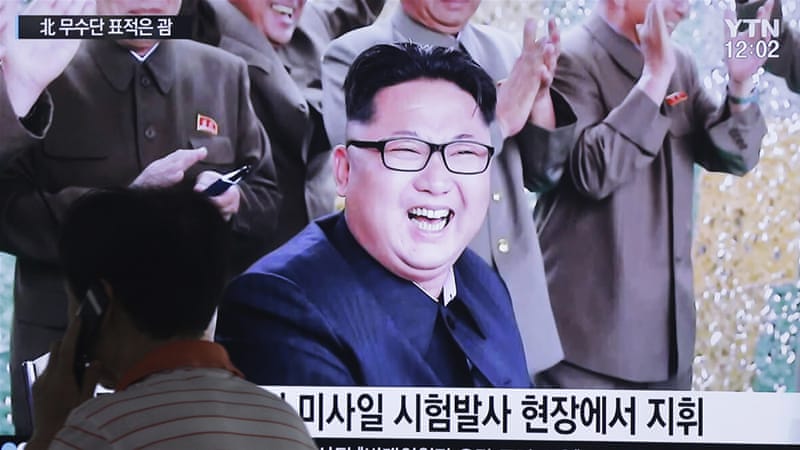On Notice, Again
 A TV news channel shows an image of North Korean leader Kim Jong-un [Ahn Young-joon/AP]
A TV news channel shows an image of North Korean leader Kim Jong-un [Ahn Young-joon/AP]"[Kim Jong Un, Supreme Commander of the Korean People's Army rehearsed] making pre-emptive strikes at ports and airfields in the operational theatre in south Korea, where the U.S. imperialists' nuclear war hardware is to be hurled.""All of a sudden" is as good a description as any of the volatile nature of Jim Jong Un. Partly, it's his reaction to the intolerable assault on his imperial majesty by the United States' July 6 sanctioning as a personal insult to the dignity of North Korea's leader. Citing human rights abuses, North Korean assets in the U.S. which cannot be many, have been frozen. And Americans may no longer do business with the hermit Kingdom.
"['The drill simulated the detonation of] nuclear warheads mounted on the ballistic rockets at the designated altitude over the target area."
"Kim Jong Un expressed great satisfaction over the successful drill [praising the soldiers for being] fully ready to carry out any order issued all of a sudden."
Korean Central News Agency
That insult, after the March UN Security Council sanction banning all conventional weapons trade with North Korea and mandating that all North Korean cargo entering or exiting a country's ports be inspected by that country, represents an intolerable imposition on North Korean freedoms. Only Beijing stands in the position of choosing to limit cooperation on the sanctions.
All of which have elicited the predictable response, with North Korea practising blowing up South Korean ports and airports with nuclear warheads and launching ballistic missiles; as effective a way as any of ventilating rage. Three missiles were launched; two short-range Scuds and a single medium-range Rodong from a launch site south of Pyongyang to fly 600 kilometres across the peninsula.
Though they were aimed to land in the sea off the east coast, South Korean officials identified the potential to hit the southernmost parts of their country. All of which reflects a never-ending circuit of provocations back and forth each resulting in raging condemnations and alter-provocations. Because of the nuclear test and the ongoing missile projections, South Korea agreed to have the U.S. station a sophisticated anti-missile system southeast of Seoul.
Details to deploy the terminal high-altitude area defence battery (THAAD) to South Korea, to be operated by American forces stationed there, have been finalized. Its purpose is for the interception of incoming missiles, since South Korea too wishes to be "fully ready to carry out any order issued all of a sudden". In self-defence, of course.
South Koreans living in rural Seongju, where the battery is to be placed, are none too thrilled about it. They are, in fact, rather unhappy that they could potentially become targeted by their unpleasant neighbour, with the presence of the battery as a goad. When their prime minister visited to quell their fears, he was greeted by a battery of eggs aimed at him.
All of which events have conspired to inspire North Korea to keep spewing boasts of technological breakthroughs in their nuclear weapons program. Geared to make South Koreans squirm and sweat in trepidation, even though doubt remains whether North Korea has succeeded in producing nuclear warheads sufficiently small to be mounted on a missile for starts, and then being able to propel that missile accurately to a chosen destination.
Labels: Intervention, North Korea, South Korea Conflict, Threats, United States

<< Home